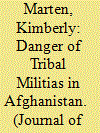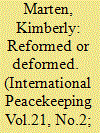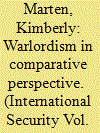| Srl | Item |
| 1 |
ID:
153491


|
|
|
|
|
| Summary/Abstract |
This article reviews a variety of historical analyses of the KGB and its follow-on organizations to determine whether and how its organizational culture may be reflected in current Russian politics and foreign policy. Using the suggestion by some analysts that a ‘soft coup’ using KGB methods of kompromat may have occurred in the late Yeltsin era, it analyzes how remnants of the KGB organization may be influencing the directions of President Vladimir Putin’s actions. It concludes with an argument about what this might mean for Russia after Putin and about why Russia’s unique intelligence culture may make a comparative theory of ‘intelligence states’ difficult to create.
|
|
|
|
|
|
|
|
|
|
|
|
|
|
|
|
| 2 |
ID:
092677


|
|
|
| 3 |
ID:
158952


|
|
|
|
|
| Summary/Abstract |
This article re-examines the history of NATO’s original post-Cold War enlargement to include the Visegrad states of Poland, Hungary, and the Czech Republic. It uses both published materials and the author’s new interviews with key US and Russian policymakers, and employs robust qualitative counterfactual methods to ask two questions: whether there were any realistic alternatives to NATO enlargement, and whether NATO enlargement was responsible for the downturn in Russian relations with the West. It concludes that domestic politics were the dominant factors explaining policy directions on both the US and Russian sides; that NATO enlargement was probably inevitable given US domestic political factors and West European acquiescence; that Russia’s turn against the West preceded the NATO expansion discussion in the US; that the tenor of the Russian turn is explained by status concerns rather than military threat perceptions, and that it was aggravated most by Western unilateral airstrikes rather than NATO’s geographical enlargement; and that the one policy initiative that might have realistically slowed NATO enlargement if it had been adopted differently, Partnership for Peace, did not affect those Russian status concerns and thus could not have redirected the relationship.
|
|
|
|
|
|
|
|
|
|
|
|
|
|
|
|
| 4 |
ID:
133137


|
|
|
|
|
| Publication |
2014.
|
| Summary/Abstract |
A great deal of international attention and funding was given to reform and training of the Palestinian Authority Security Forces (PASF), starting with the Oslo Accords process in 1993 and accelerating with the advent of Fayyadism and the expulsion of the Palestinian Authority government from Gaza in 2007. Many donors and other supporters in the US, the EU, and Israel claimed this process as a success story, and indeed from 2008-2010 local conditions looked hopeful in the fragile, post-conflict West Bank proto-state. But soon unresolved political conflicts inside the West Bank encouraged patronage-based violence to reemerge within the security forces, and the fractured approach of the international community aggravated the situation. By 2013 reform had stalled. This article explores the history of patronage politics in the PASF and uses the Palestinian example to highlight the tensions inherent in contested visions of security, when international donors define success in terms of anti-terrorism rather than genuine domestic security governance.
|
|
|
|
|
|
|
|
|
|
|
|
|
|
|
|
| 5 |
ID:
170918


|
|
|
| 6 |
ID:
076182


|
|
|
|
|
| Publication |
2006.
|
| Summary/Abstract |
Warlordism creates significant problems in failed states: it impedes the development of stable and secure societies, thwarts economic growth, and creates new threats to international security. Through a comparative study of four seemingly disparate cases-medieval Europe, Republican China, and Somalia and Afghanistan in the mid-2000s-it is possible to develop an inductive, generalizable definition of warlordism. Warlordism emerges when armed men seize small slices of territory in disintegrating states for their own benefit, using charisma and patronage ties to cement their local authority, and disrupting commerce and investment through their fragmentary rule. Two causal factors were necessary for the demise of warlordism in medieval Europe and Republican China: the presence of a powerful and aggrieved economic interest group, and the appearance of a transformative idea from outside the existing system that supported the interest group's actions. If this same causal relationship holds true today, then warlordism will be more quickly eliminated in Somalia than in Afghanistan. The international community can take action to help eliminate warlordism, but change ultimately depends on domestic factors and will likely be violent.
|
|
|
|
|
|
|
|
|
|
|
|
|
|
|
|